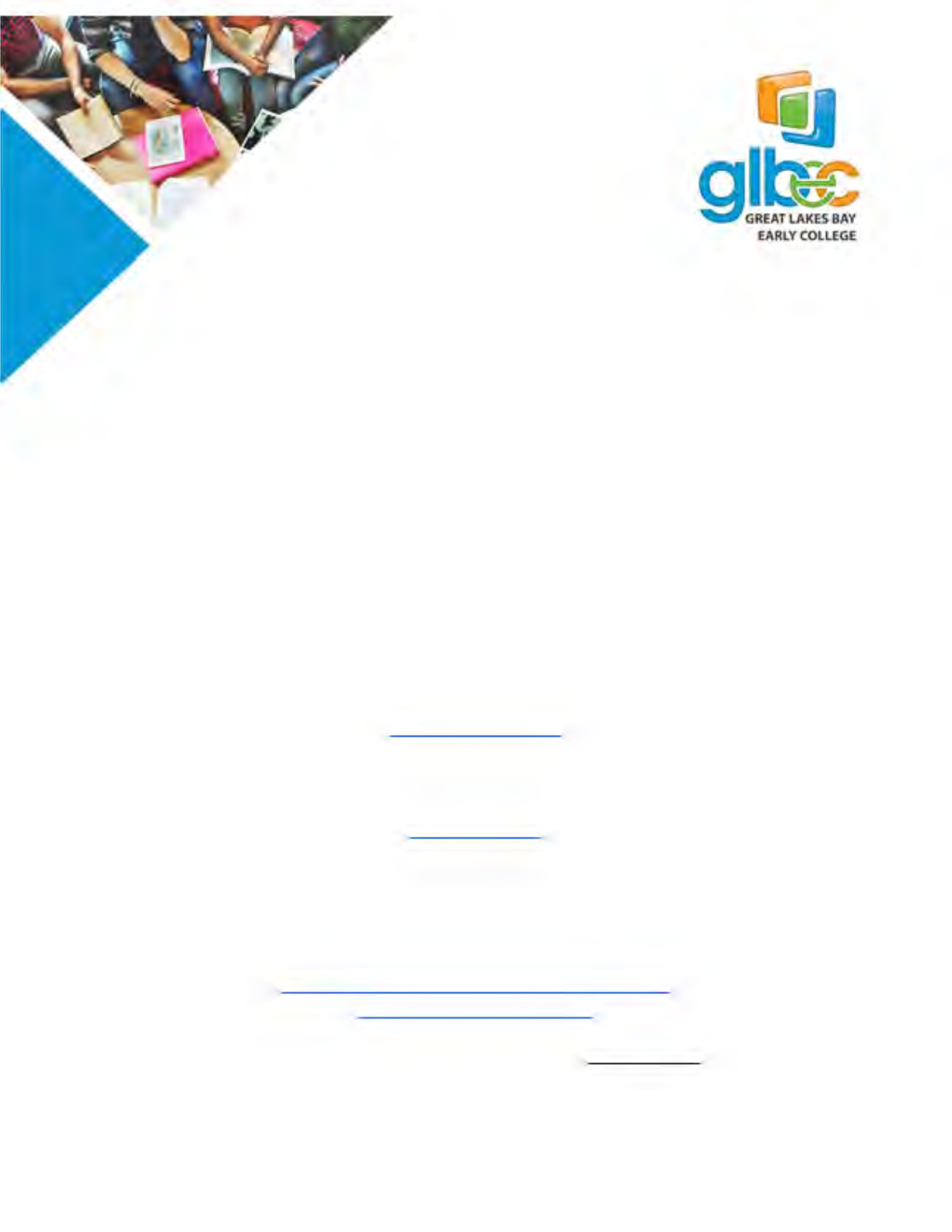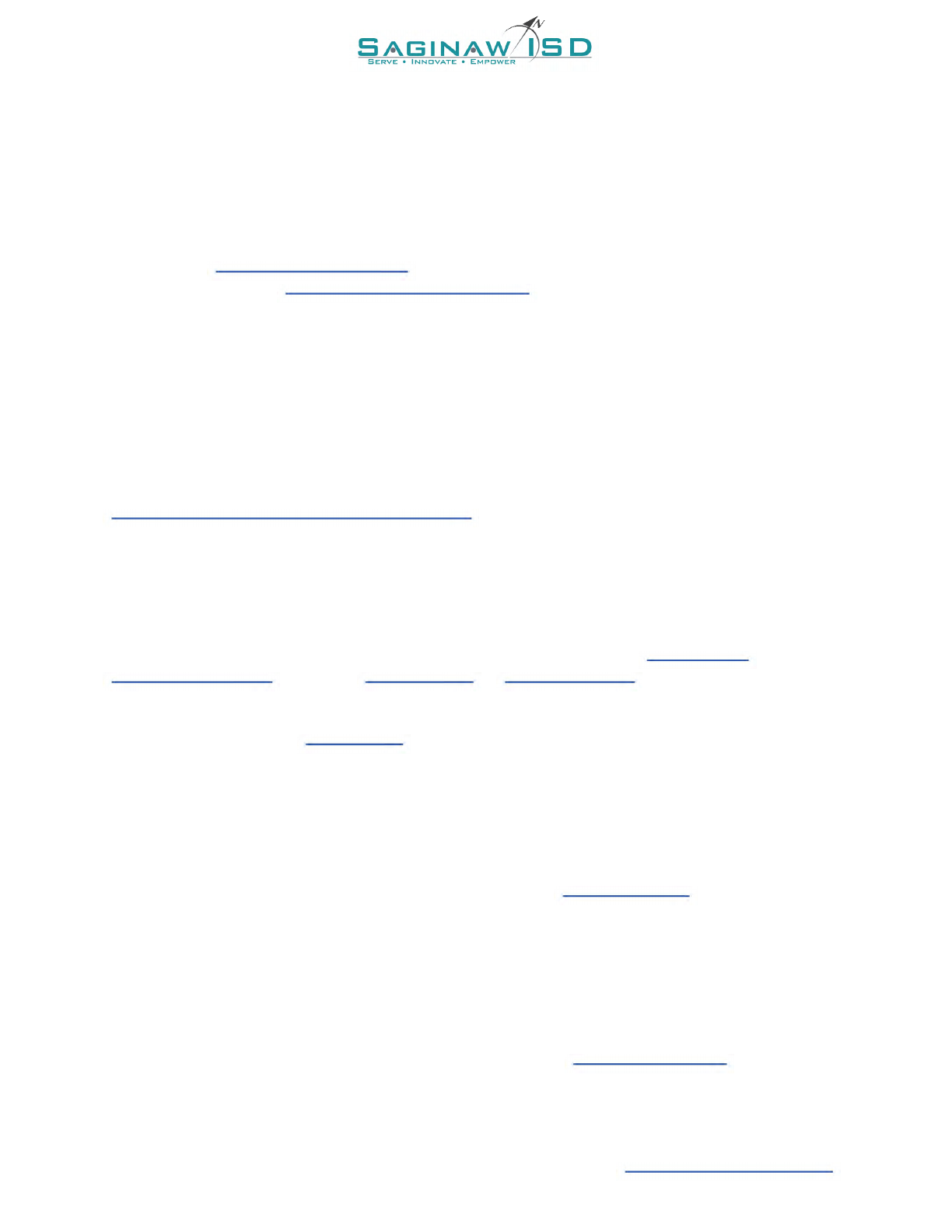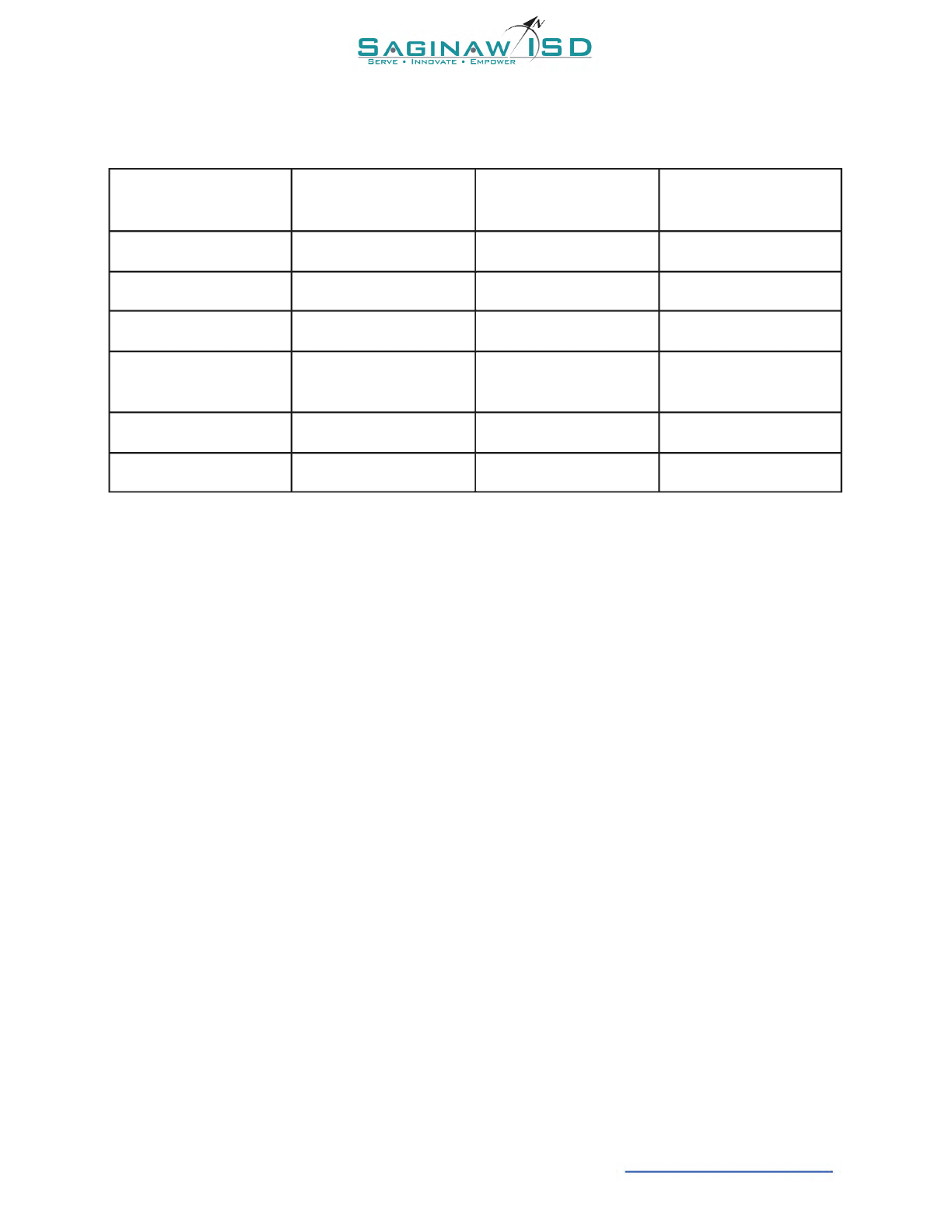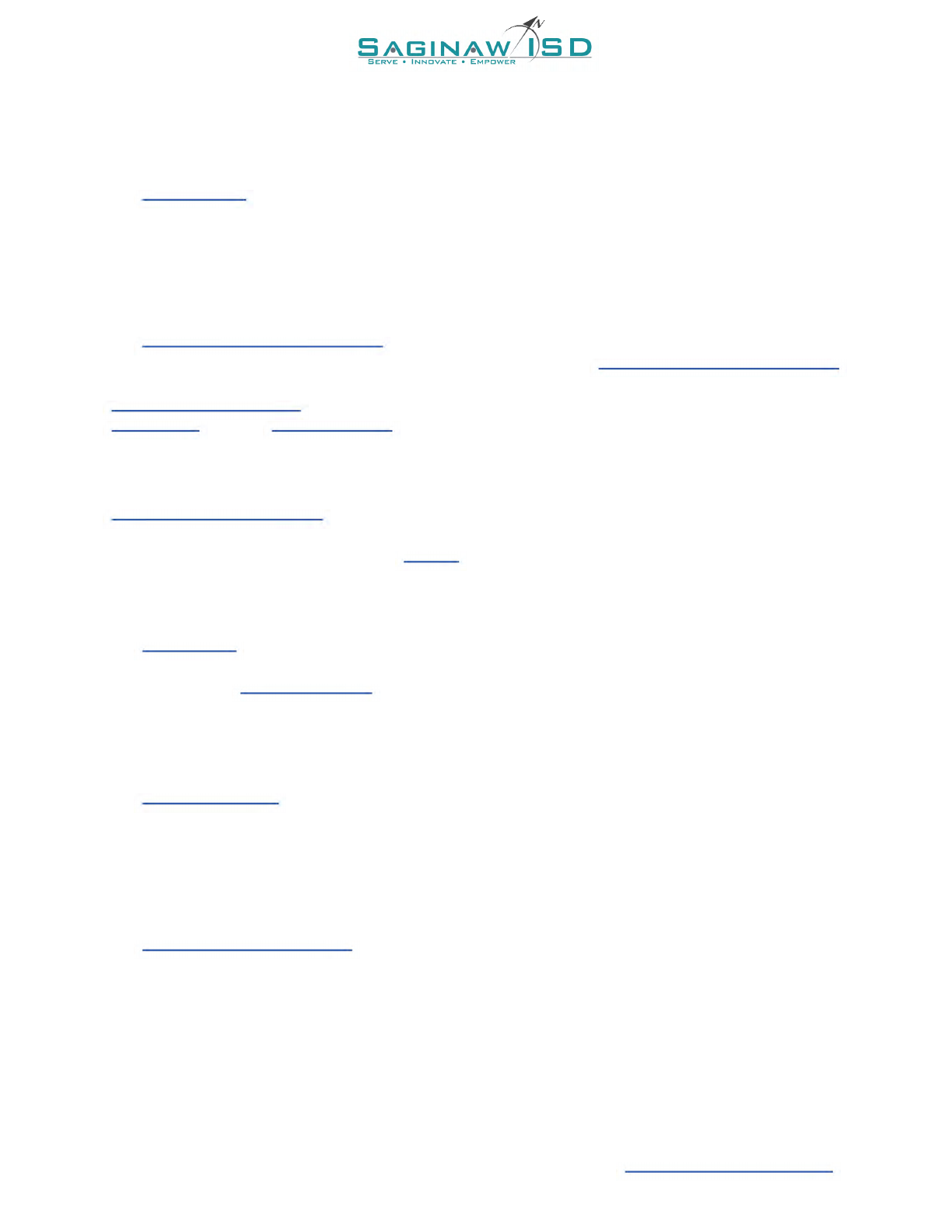
Student/Parent Handbook
2022 - 2023
Kevin Summey-GLBEC Director
Karen Huff - Program Secretary
Delta College-S061
1961 Delta Road
University Center, MI 48710
989-686-9146
www.sisd.cc/great-lakes-bay-early-college
www.facebook.com/glbec
Approved by Saginaw Intermediate School Board July 11, 2022
liJ
g!
!;§
;.
EARLY
COLLEGE

TABLE OF CONTENTS
INTRODUCTIONS
3
Welcome Letter
3
Vision and Mission
4
Vision
4
Mission
4
GLBEC Vocabulary
4
Role of Students, Parents, Teachers, and Mentors
5
Course Descriptions
7
Fall Semester
7
Science Methods
7
English Literature and Writing
7
GLBEC Math Placement
7
College Readiness
8
Typical Daily Schedules
8
Fall Semester
8
Winter Semester
9
POLICIES AND PROCEDURES
9
Code of Student Conduct
9
Extracurricular Code of Conduct
10
Academic Integrity
10
Attendance
11
Pupil Accounting
12
Academic Probation
12
GLBEC Grade Scale
13
Skyward
13
Program Completion
13
Withdrawal or Failed Courses
15
Transcripts
15
Letters of Recommendations
15
State Required Testing
16
College Course Registration
16
Textbooks
16
Technology
16
School Closings
17
Partner School Activities
17
Visitors on Campus
18
Change of Personal Information
18
Privacy
18
Work Permits
18
STUDENT SUPPORT SERVICES
19
Transportation
19
Dining
19
Version 6.8.22
1
Return to Table of Contents

Information Technology Services
19
Libraries
19
The Center for Academic Achievement
19
The Writing Center
20
The Math and Physics Resource Center
20
The Teaching/Learning Center
20
WRIT Center (Writing, Reading, & Information Technology)
20
Student Life
20
Fitness and Recreation
21
Special Education and Disability Services
21
Counseling Services
21
Health Services
21
Study Abroad
21
RECOGNITION
22
ACKNOWLEDGEMENT
23
PARTNERSHIPS
24
Version 6.8.22
2
Return to Table of Contents

INTRODUCTIONS
Dear Students and Parents/Guardians:
On behalf of the Great Lakes Bay Early College (GLBEC) faculty and staff, I want to thank you for
joining the diligent and dedicated community of learners here at Delta College and Saginaw Valley State
University. We are excited to have you join us for the upcoming academic year.
This year will be a year of accomplishments; many of which will be entirely different than other students
in other schools. You will be academically, socially, and emotionally stretched, working harder than you
have ever before. You will be treated as college students and young adults and allowed opportunities that
will help you mature into college and career readiness sooner than your peers.
As GLBEC students on the campuses of Delta College and SVSU, you will be entrusted to move about
campus with freedom; no bells or bathroom passes, no dress codes or detentions, no lockers or
lunchrooms. As long as you are appropriate in excusing yourself from class if needed, wearing clothing
suitable for walking the campus in all types of weather, and identifying a support group that will make the
transition to campus life easier, personal choices are encouraged and accepted.
Expectations for learning and engagement will be high at GLBEC. You will learn to study smarter and
harder, typically finding 2 - 5 hours per day in your schedule for homework. GLBEC team members
recommend using time on campus wisely to complete as much coursework as possible.
The GLBEC team hopes that you embrace your experience here on campus and wants you to know that
your mentor will help you with that journey. You and your mentor will work together to develop your
personal education plan. GLBEC’s goal is that within the first semester you will transition into a
well-prepared college student and embark on your plan for earning your 60 college credits or appropriate
certificates to prepare you for your next step.
These often challenging experiences may seem daunting, but with your perseverance and the support of
your mentor teachers, your success is almost certain.
I encourage you to embrace this opportunity and prepare yourself to jump right in.
Sincerely,
Kevin Summey
Great Lakes Bay Early College Coordinator
Version 6.8.22
3
Return to Table of Contents

Vision and Mission
Consistent with the early college movement to provide unique educational opportunities, Great Lakes Bay
Early College offers college access to all‒particularly those traditionally underrepresented in higher
education. We value equity, diversity, and individuality.
Vision
The vision of the Great Lakes Bay Early College is to educate, empower, and embolden the next
generation: specifically first-generation college students, with the necessary soft skills, mastery learning,
and personalized choices in order for them to positively impact the future.
Mission
The mission of the Great Lakes Bay Early College is to facilitate an individualized experience on a
college campus, allowing students the opportunity to take ownership of their education with the support
of a team of educators. With an emphasis on innovation, critical practice, and high expectations, students
have the ability to earn a high school diploma, a Michigan Early/Middle College Association Technical
Certificate, a Great Lakes Bay Early College Program Certificate, while also earning up to 60 transferable
college credits or an associate degree.
GLBEC also embraces the vision and mission of the Saginaw Intermediate School District as we are a
school under its direction and support.
GLBEC Vocabulary
This handbook uses some terms that may be unfamiliar in the context of early college; therefore, we list
some here that are determined to be the most important to our program.
+1: The additional year of education after a student’s senior year, which each early college student takes
to work toward completing 60 college/career credits prior to high school graduation.
Blended learning: Also called hybrid learning or mixed-mode learning, blended learning is the practice
of using both online and in-person learning experiences. In a blended-learning course, for example,
students might attend a course taught by a teacher in a traditional classroom setting while also
independently completing online components of the course outside of the classroom.
Cohort: The collective name of all new, incoming students who join GLBEC in the same academic year,
i.e., all incoming 2022-23 students are members of Cohort 12.
Credentialing: A decision-making process by GLBEC staff and faculty, with input from students and
parents, to transition students towards courses at Delta College or SVSU. The first decision for
credentialing is made for the winter semester of each cohort’s incoming year, with additional reviews after
every semester until program completion.
Version 6.8.22
4
Return to Table of Contents

Educational Development Plan (EDP): An educational plan, mandated by the State of Michigan, that
students develop in conjunction with their mentor and teachers. The students use the plan to integrate their
GLBEC and college course selections in conjunction with career goals and objectives. GLBEC uses an
internet based career exploration and planning tool to explore career and college options and develop a
career plan. At the university and college level, GLBEC utilizes course audits, internal systems, and
course planning software to assist students in mapping their future.
Mentor meetings: Students are required by the program to attend all mentor meetings. Students within
their first year of the GLBEC program attend mentor meetings weekly. Experience shows a strong
correlation between student success and mentor meeting attendance. Failure to attend required meetings
demonstrates a lack of soft-skill development and may influence a student’s progress and credentialing
status and will also require additional college readiness courses.
MEMCA: The Michigan Early/Middle College Association is a voluntary alliance of educators actively
involved with GLBEC and other early/middle colleges to significantly increase the collegiate and
post-secondary success and completion rate of Michigan youth, especially those underrepresented in
higher education. Not all early/middle colleges, however, are members of this association.
Self-advocacy: The power a student has to communicate and seek the academic, social, and/or
environmental needs which will productively develop the student further.
Soft skills: Learned behaviors that positively influence academic and career success. These behaviors
include, but are not limited to, responsibility, attendance, preparation, follow-through, communication,
and self-advocacy.
Role of Mentor, Teacher, Student, and Parent
Mentor: At the beginning of each academic year, incoming students will be assigned a mentor, and that
partnership will continue until completion of the program. Regular, one-on-one meetings are mandatory
throughout the program and are essential to fulfilling the role of a mentor. Additional information about
mentoring can be found in the Mentoring Guidebook.
Role of Mentor:
● Listen to the needs, concerns, and aspirations of the student.
● Monitor student’s progress in GLBEC courses and campus transition.
● Help make informed choices for a student’s Educational Development Plan.
● Advocate on the student’s behalf.
● Offer feedback, support, praise, and constructive criticism to help students improve soft skills and
academic performance.
● Communicate to the parent/home school district as needed.
Teacher: Each Fall Semester, incoming students will take four GLBEC courses: Science, Math,
English/History, and College Readiness. Non-credentialed students in each cohort will also take GLBEC
courses in the Winter semesters; courses will vary per each student’s educational needs.
Version 6.8.22
5
Return to Table of Contents

Role of Teacher:
● Provide course content and a framework for soft skills.
● Give regular feedback to students regarding their academics and soft skills.
● Communicate with mentors and parents, as needed, regarding students’ academics and soft skills.
● Make themselves available for individual content instruction before and after school, inside or
outside of class time.
● Create and encourage a classroom conducive for instruction and learning.
Student: A student has the most important role in the program: a student helps mentors, teachers, and
parents fulfill their roles. Expectations are the same for students whether enrolled in GLBEC, Delta,
and/or SVSU courses.
Role of Student:
● Self-advocate: be cognizant of your academic and personal needs; communicate and pursue them.
● Check email daily; respond appropriately and meet established deadlines.
● Regularly attend mentor meetings as determined with mentor.
● Be prepared to attend classes both physically and mentally.
● Recognize the importance of education for the fulfillment of future goals, i.e., credentialing and
college and career success. (This may mean temporarily giving up a job, sport, or other
after-school commitment until the necessary soft skills are developed to successfully manage the
various demands of college and career courses.)
Parent :
1
As major stakeholders in their child’s education, this role will change as your student transitions
into a self-advocate, but it will be just as important.
Role of Parent:
● Communicate with student on a regular basis, which may include monitoring daily progress and
due dates.
● Read all communications from GLBEC, Delta College, SVSU and SISD and respond as needed.
● Check Skyward gradebook and attendance at least once a week. (Encourage student to share
Delta or SVSU’s system with you once credentialed).
● Ensure that your student has the appropriate supplies, time, and space conducive to studying and
completing coursework.
● Provide mentor with information regarding any major life events that may impact student success.
● Contact mentor with any academic concerns via email or phone.
Course Descriptions
Fall Semester (August - December)
The following courses are required for all incoming cohorts. Successfully mastering the objectives of each
course will result in credentialing for college and career courses for all the following successful semesters
in the program. All courses are authorized under the National Collegiate Athletic Association Eligibility
Center
1
GLBEC recognizes that a student’s family can take many forms. For the purposes of this handbook, GLBEC
utilizes the term “parent” to encompass all individuals who act as legal guardians for their students.
Version 6.8.22
6
Return to Table of Contents

Science Methods
In this course students will survey the relationship between matter and energy, exploring what it means to
investigate scientifically with a heavy emphasis on data collection, analysis, and conclusion. By having
matter and energy as the focal point of this course, students can transition between science subjects,
seeing the relevance and interrelatedness of all scientific knowledge in our lives. This course will address
portions of the Michigan Merit Curriculum standards of Chemistry, Physics, Biology, and Earth Space, as
well as integration of the Next Generation Science Standards. Successful credentialing in the sciences will
fully prepare students for introductory SVSU and Delta College science courses. Course experiences
include but are not limited to: laboratory experience and protocols, data analysis, scientific writing,
collaborative research, and communication of research.
English Literature and Writing
This course will give students the tools to be successful in a variety of college courses but specifically
literature, written and oral communication, and social science courses. Instruction will emphasize how
students can be better readers, writers, speakers, researchers, analyzers, and synthesizers. Furthermore, the
ability to communicate ideas, opinions, and solutions in a critical manner will be sharpened to fulfill the
Common Core Standards for English Language Arts. When students take the course over two semesters,
it continues upon the learning in the first semester and expands their ability to interact with the literature
and craft compositions with emphasis on research and various citation styles.
GLBEC Math Placement
Instead of a traditional lecture-based math course, this blended-learning course is interactive and paced to
the individual’s needs. Students will learn mathematics concepts based on the Common Core
Mathematics Standards. By utilizing Khan Academy and Google Classroom, students will learn at their
own pace using a combination of live teacher lessons, critical-thinking projects, computer-based practice
exercises, instructional videos, and teacher assistance. Students will work both inside and outside of class,
either at home or in campus computer labs. Students will be assigned to a designated course based on
their incoming transcripts. The course options include Alg I, Geometry, Algebra II, and Pre-Calculus.
College Readiness
Each mentor teaches a course to assigned incoming mentees. The course is designed to increase college
and career success by emphasizing instruction on soft skills like responsibility, follow-through,
attendance, and ownership. Further college readiness instruction will also be incorporated in the GLBEC
core courses on a regular basis and individualized in mentor meetings. Successful completion of this
course will be demonstrated by being credentialed for college and career courses, by completing the
assigned digital portfolio, and by maintaining an Educational Development Plan with the mentor.
Pass/Fail grades will be given.
Additional information about college readiness can be found in the Mentoring Guidebook.
Typical Daily Schedules (Subject to change)
Version 6.8.22
7
Return to Table of Contents

Fall Semester (August - December)
GLBEC Schedule
Times (Monday -
Thursday)
GLBEC Schedule
Times (Friday)
Mentor Hours
7:30 - 8:20
Mentor Hours
7:30 - 8:20
Block 1: Core
8:30 - 9:50
Block 1: Core
8:30 - 9:50
Block 2: Core
10:00 - 11:20
Block 2: Core
10:00 - 11:20
Block 3: College
Readiness/Seminar
12:00 - 12:50
Block 3: Core
11:30 - 12:50
Block 4: Core
1:00 - 2:20
Academic Support
1:30 - 2:20
Mentor Hours
2:30 - 3:30
Academic Support
2:30 - 3:30
Students are expected to stay on campus from 2:30 to 3:30 every school day, Monday - Friday.
We recognize that jobs and sports sometimes interfere with this expectation; however, utilizing
office hours for mentor meetings and tutoring, as well as using this time to study with peers, has
proven vital for college readiness.
Winter Semester (January - May)
Many of the GLBEC students will be taking one or more college and career courses this semester;
however, some students will need to continue one or more of the GLBEC fall courses in order to reach
credentialing. For students taking GLBEC courses, objectives will remain the same but will include
additional instruction or enrichment opportunities in order to earn credentialing for the following fall.
Daily schedule for Winter will vary per student requirements, but will be similar to what is referenced
above.
During the final four weeks of the semester, enrichment opportunities are offered to all students to fulfill
semester expectations; some students may even earn additional credits toward graduation. Course
offerings vary per semester based on the needs and interests of the students and faculty, but past
opportunities have included Data Field Analysis and Creating Theatre. Daily schedule for the last four
weeks will vary based on student requirements, but will be similar to a Fall Friday schedule.
Version 6.8.22
8
Return to Table of Contents

POLICIES AND PROCEDURES
Code of Student Conduct
GLBEC is a guest on two campuses and will not tolerate any behavior by its students that is in violation
of current State of Michigan student codes of conduct expectations. GLBEC code of conduct prohibits all
students from
● smoking on campus
● possession or use of weapons
● possession, use or sale of drugs, alcohol, or any controlled substance
● any form of violence, verbal/physical harassment, or sexual misconduct involving any member of
the learning community
● entering housing accommodations or dormitories
● inappropriate or immature behavior not consistent with what is expected of a college student
● any form of academic dishonesty (See Academic Integrity)
● any violation of a policy written in this handbook, the SVSU Code of Student Conduct, and/or the
Delta College Student Handbook the violation of any other policy not stated in this handbook.
Any violations of the Code of Student Conduct policies may result in immediate removal from the
GLBEC program, be reported to their home district, and/or disciplinary actions from the home school,
including, but not limited to, suspension or expulsion.
Any violation or alleged violation of existing state, federal, and local laws will be under the jurisdiction of
Campus Safety. Students are expected to cooperate fully with any investigation while exercising their due
process rights.
Furthermore, GLBEC students who participate in activities with their home district are required to adhere
to the code of conduct of their district, including eligibility requirements for participation in
extracurricular activities. Any violation of the district’s code of conduct may result in the student being
removed from the GLBEC program.
Extracurricular Code of Conduct
While GLBEC expects academics to be a priority, it also understands the importance of extracurricular
activities in the educational process. As participants in any extracurricular activity, students are expected
to make a commitment to not only abide by the rules set within the activity but also the high expectations
of personal conduct expected by Great Lakes Bay Early College. Participation in extracurriculars is a
privilege, not a right.
GLBEC will work closely with the partnering school district sponsoring the extra-curricular activity to
ensure expectations are being met. Failure to adhere to established expectations may result in removal
from activity.
Version 6.8.22
9
Return to Table of Contents

Academic Integrity
Students who practice academic integrity uphold high standards in their work, actions, and expectations
inside and outside the classroom. GLBEC faculty and staff expect students to complete all tasks honestly
and to the best of their ability out of respect for their peers, teachers, institutions, and self. Student actions
should enhance the value of their diploma and degree and promote a positive image of Great Lakes Bay
Early College, Delta College and Saginaw Valley State University.
Students who take responsibility for their own learning will do their own work and give others credit for
contributions that are not their own work. All students are expected to be rigorously honest in GLBEC
and college courses; students are also expected to adhere to Delta College’s Integrity of Student Academic
Work and SVSU’s Academic Integrity Policy; violations are considered cumulative for the program.
Academic Dishonesty can take many forms; most common are plagiarism and cheating:
Plagiarism is a violation of academic integrity. The definition of plagiarism is expressed as, but
not limited to, submitting another’s work as one’s own, failing to give proper credit or citation for
the use of another’s work, or turning in work previously submitted for another class. Using the
ideas of another, even if put in your own words, is plagiarism.
Cheating occurs whenever one attempts to gain an advantage through a violation of rules
regarding the relevant behavior. It should be assumed that collaboration is cheating unless
explicitly authorized.
Violations: Any violation of academic integrity will be taken very seriously. The following steps may be
taken, in conjunction with possible placement on academic probation.
Possible Consequences for Violations:
1
st
Offense: failed grade for assignment; upon teacher discretion, a redo of the assignment for
partial credit may be offered.
2
nd
Offense: failed grade for assignment, meeting with teacher and mentor, and review of
credentialing.
3
rd
Offense: failed grade for the course and expulsion from the program.
All violations to the academic honesty policy may be reported to the college’s office of student conduct.
Attendance
At GLBEC, attendance is evaluated as part of the student’s soft skills. Experience has proven that
attendance issues directly correlate with college success; thus student attendance influences college
credentialing.
Version 6.8.22
10
Return to Table of Contents

Absences are counted per class. For example, if a student misses an entire day of school, he/she will
accrue an absence for each class missed. Missing five or more periods within an individual class may
result in a failing grade for the course, lack of credentialing, de-credentialing, academic probation, and/or
removal from the program. If a student accrues forty absences within the academic year, he or she may be
removed from the program.
Tardies will affect attendance as well. If a student is less than twenty minutes late, a tardy will be marked.
If a student misses more than twenty minutes of the class, a student will be marked absent.
In addition, students who are physically present in class but who are not mentally engaged in discussion
or participate in class activities will receive a Participation Absence (PA).
Any student who accrues a total of twenty absences (both physical and participation) and/or five absences
in an individual class, may be placed on academic probation.
It is a student’s responsibility to communicate with teachers and mentors as soon as possible about an
absence. Parents (or students age eighteen years or older) should notify the GLBEC main office at
Please note that the reason for an absence does not affect the impact that this absence has on a student’s
progress.
When possible, find out the missing work and complete it before returning to class. In all other cases,
make arrangements with each of the teachers upon returning to complete the work missed. If a student is
absent the day of an assessment (like a test), students are expected to complete the assessment the
following day at a time convenient for the teacher. Students who are absent multiple days prior to an
assessment must coordinate with the teacher to determine the alternate testing date.
GLBEC is required to follow Saginaw County’s attendance policy.
Delta College and SVSU courses have their own attendance policies. Students must adhere to
those as well.
Pupil Accounting
GLBEC is a public education program in partnership with school districts within the Great Lakes Bay
Region. Funding for GLBEC is provided by the State of Michigan through our partner school districts.
Funding each year is based on Fall and Winter pupil count. GLBEC’s pupil count is then communicated
to each student’s district. Attendance for GLBEC classes is recorded through Skyward. Students in
college courses are required to complete an Attendance Verification Form, which requires a signature
from each college instructor, each semester.
There are instances within a semester where a student may not be enrolled on a full-time basis. In the
event that the aforementioned occurs, a reduced schedule may be requested. A reduced schedule is
defined as being enrolled less than full-time but no less than 75% of full-time. Students and their parents,
in consultation with their mentor, may request a reduced schedule by completing a Reduced Schedule
Request Form. In accordance with the Michigan Department of Education policies as specified in the
Version 6.8.22
11
Return to Table of Contents

Pupil Accounting Manual, the request for a reduced schedule must demonstrate that the arrangement is in
the best educational interest of the student and requires mentor approval.
Attendance Verification Forms and Reduced Schedule Request Forms must be turned in at the beginning
of Fall and Winter Semester. Completed forms are submitted to the mentor on time. These forms are state
requirements. Therefore, students who fail to submit the forms into GLBEC may influence a student’s
progress and credentialing status and could also require additional college readiness courses or a removal
from the GLBEC program.
Academic Probation
Students may be placed on academic probation under a variety of circumstances that result in insufficient
progress (soft skills and/or academic). There are two levels of probation: I and II. Each has specific
requirements tailored to each student’s unique circumstances, which would be outlined in a probation
meeting with members of the GLBEC staff and faculty, student, and parent. If GLBEC places a student on
academic probation, their home district will be notified.
Probation I status may be given when early signs of struggle are demonstrated and there is a general
belief that, by following the probation process, the student will return to good standing after one semester.
A meeting with stakeholders will determine concrete steps for improvement and accountability; a plan
will be enacted with specific measurements and timeline for progress. Should a student fail to return to
good standing, the student will move to Probation II status.
Probation II status provides a final opportunity for the student to return to good standing. As in
Probation I, a plan is outlined in a meeting. Failure to meet the plan established in the Probation II
meeting may result in the student exiting the GLBEC program.
Home school districts may also have their own eligibility requirements to consider. Please,
understand that it is the student’s responsibility to follow their eligibility requirements.
GLBEC Grade Scale
Letter grade
Percent
A
93 - 100
A-
90 - 92
B+
87 - 89
B
83 - 86
B-
80 - 82
C+
77 - 79
Letter grade
Percent
C
73 - 76
C-
70 - 72
D+
67 - 69
D
63 - 66
D-
60 - 62
F
0 - 59
Version 6.8.22
12
Return to Table of Contents

Courses graded on a Pass/Fail basis are determined by student fulfillment of the course requirements.
Earning lower than 70% in any college class affects college credentialing and prerequisites. However,
students earning 60% - 69% may receive high school credit for the Michigan Merit Curriculum.
Skyward
GLBEC uses Skyward for attendance and grades for all courses. Students and parents will be given a
username and password by the start of Fall Semester and are responsible to log into their accounts on a
regular basis to check grades and attendance accuracy.
In addition to having access to grades through Skyward, midterm reports with information about soft
skills and credentialing are communicated to parents each semester.
Program Completion
At the end of a student’s final year, GLBEC holds a Completion Ceremony where the student will receive
the GLBEC completion certificate. At the same time, a student’s home high school will be notified to
award a high school diploma based on the culmination of work done by a student to fulfill requirements
of both the Michigan Merit Curriculum and the GLBEC program requirem
ents.
To earn a high school diploma through GLBEC, students must complete the following:
• Michigan Merit Curriculum (See below)
• College Readiness Curriculum
• A minimum of 15 transferable college credit hours (non-remedial courses)
• Communication 105 (A, B, or C) at SVSU or Communication 108W, 112W, 114W, 202W or an
approved Communication course at Delta College specific to a program of study
AND one of the following options:
• 100 hours of verified community service
• A minimum of 40 hours of verified career exploration, internship, job shadowing, or clinical
experience
• A combination of the two that equals 70+ hours
Up to 35 hours may be carried over from previous experience with appropriate documentation.
Version 6.8.22
13
Return to Table of Contents

Fulfillment of a high school diploma also fulfills the requirements for the Michigan Early/Middle College
Association Technical Certificate (MEMCA) which is a national accredited organization for some early
colleges.
The Michigan Merit Curriculum:
As determined by the State of Michigan, The Michigan Merit Curriculum is accomplished through a
combination of original high school transcripts, GLBEC course completion, and Delta or SVSU course
completions.
Keep in mind that students who earn their high school diploma are ineligible to stay in GLBEC.
Students are expected to stay for their +1 year, completing both High Graduation and GLBEC Program
requirements.
Students are encouraged to walk in their home district’s graduation ceremony at the end of their
twelfth-grade year in addition to participating in the GLBEC ceremony in May of their final year.
Walking in a home district ceremony will be celebratory only; students will not receive the diploma at this
time. Please check with your home school district regarding their policies concerning graduation. GLBEC
provides a cord with our school colors to each senior that they may, if their home school allows it, wear at
their graduation. It is the student’s cord to keep.
Withdrawal or Failed Courses
In general, GLBEC does not allow students to withdraw from a college or university class.
GLBEC views failure with a growth mindset. On some level, failure allows students to learn from their
mistakes. Students who fail a college or university class may have the opportunity to retake a course with
approval. Approval must be sought by the student via his or her mentor and will be discussed after
demonstration to the GLBEC staff of changes needed to ensure a better outcome. Any student that
withdraws from a class without consulting their mentor with final approval from the Program Coordinator
will have to repay the costs associated with the course. This rule applies if an instructor drops a student
from class due to a lack of attendance and participation.
Transcripts
GLBEC transcripts are ordered electronically using Parchment. Delta College transcripts are ordered at
the Registrar's Office in B100 or online; SVSU transcripts are ordered at the Office of the Registrar in
Wickes 151 or online and; be advised you will be assessed a fee to receive your University/College
transcript.
At the end of each semester, GLBEC will share student information regarding course articulation with
participating districts.
In addition, college, honors, AP & IB courses are weighted on a 4.5 scale as is common practice in
schools to weight for Honors or AP/IB courses. On the transcript there will be two GPAs listed:
unweighted and weighted. Unweighted and weighted are a combination of all high school and college
courses.
Version 6.8.22
14
Return to Table of Contents

Letters of Recommendation
Students wishing to seek a letter of recommendation from one or more faculty or staff members must
submit their request no later than two weeks before the letter is expected/due, along with the recipient of
the letter, the purpose/objective of the letter, and the due date via email. In the case where an essay
submission is required, the student must also include a typewritten/electronic copy of their submission
with their request for a letter of recommendation. Faculty/staff members are not obligated to write letters
of recommendation and may elect not to do so.
Similarly, students wishing to seek an evaluation on Parchment from one or more faculty or staff must
first submit their request via email before requesting the information via Parchment. Faculty/staff
members are not obligated to submit evaluations on Parchment and may elect not to do so.
State Required Testing
GLBEC students must participate in the Preliminary Scholastic Aptitude Test/National Merit Scholarship
Qualifying Test (PSAT/NMSQT), the Michigan Merit Exam (MME), and the Scholastic Aptitude Test
(SAT), ACT WorkKeys and the Michigan Student Test of Educational Progress (MSTEP) when
scheduled. GLBEC students enrolled in college courses during the scheduled testing period are not
provided an excused absence, but are required to make alternative arrangements with their course
instructors. Dates, times, and sites for testing are provided in advance; since only a limited amount of
absences are permitted in courses, students should plan their time accordingly.
Students who fail to participate in any or all of the required assessments may be removed from the
GLBEC program for failure to follow GLBEC policies.
College Course Registration
GLBEC students who are credentialed to enroll in college courses will work with their mentor to plan
their semester schedules. At both Delta College AND SVSU, students self-register for Fall and Winter
semesters of the following academic year in the spring. Registering within the deadlines each term offers
students more variety in course scheduling. Any course changes must be approved by the student’s
mentor. GLBEC is not financially responsible for any courses not approved. If students manage to drop
courses after established times, students are responsible for the payment of those courses. GLBEC will
only pay for 12 credits per semester (Fall/Winter).
The decision to enroll/register a student at Delta College or SVSU is determined after input from the
student and deliberations over the student’s grades, college readiness, and their Educational Development
Plan.
In general, college courses are scheduled during the daytime. Evening classes are reserved for those
students in their senior year or beyond who have proven their academic abilities in GLBEC courses and
one semester of college courses. Any exceptions to scheduling are based on individualized education
plans and approved by the mentor, Program Coordinator, and parents.
Version 6.8.22
15
Return to Table of Contents

Textbooks
Textbooks are provided for students in both GLBEC and college courses as needed. All textbooks are the
property of Great Lakes Bay Early College. Students are allowed to highlight or comment in the textbook,
but are financially responsible for a lost or damaged textbook.
Books are due back to GLBEC no later than the last day of exams so that they can be returned as rentals
within the timeframe the bookstore allows. There is allowable normal wear and tear that occurs over the
course of the semester. In the event that a book is unsaleable or cannot be returned as a rental (SVSU),
then the full price of the book will be charged back to the student.
Failure to meet these financial responsibilities may prevent students from enrolling in additional college
courses and final transcripts will be held until all fines are paid.
Technology
Access to Technology: GLBEC expects all students to have access to a technological device other than
their phones. GLBEC is a firm believer in supporting student access to technology, and if needed, GLBEC
can loan students necessary devices. As with textbooks, if damaged or stolen during use, students will be
financially responsible for the replacement or repair of this device.
In addition, when a student begins taking college courses, Delta College and SVSU provide students with
access to computer labs and printing solely for academic purposes. Students are given an initial print
balance each semester. If students use all of their print balance before the end of the
semesterhttp://www.sisd.cc/glbec/, students will need to file a Print Appeal at Delta College or contact
Information Technology Services (ITS) at SVSU and may need to provide additional funds to continue to
print the rest of the semester.
Login Information: All entering GLBEC students will be given an SISD email address, with login
credentials, which will be needed for communication purposes but also to login to computers on campus.
Students have the responsibility to remember all their information and check their email on a regular
basis.
Computer Labs: There are 125 library computers at Delta College and a number of open computer labs
at SVSU. All have varying hours, hardware, and software to accommodate the schedules and needs of
students. Not all labs feature the same software titles. Software like Microsoft Office suite is fairly
common and easy to find in a lab, while other specialty titles like Matlab and SPSS are found in labs
typically frequented by students in the majors that use them the most.
School Closings
In case of school closings, GLBEC posts on WNEM TV 5, NBC25, WSMH FOX 66, our website, and
our Facebook page to provide students information. A phone call will also be sent out using the School
Messenger System. Great Lakes Bay Early College will be listed. GLBEC will close if the Saginaw
ISD programs are closed. If GLBEC classes are canceled for any reason, and the college campuses are
still open, students are expected to always attend their college classes.
Version 6.8.22
16
Return to Table of Contents

Partner School Activities
Students attending the GLBEC program are also enrolled in one of our partner districts, and therefore are
generally eligible to participate in all their district’s curricular or extracurricular activities or programs.
For specific information related to activities, please consult with the respective school. The student and
parent also should understand that GLBEC or the partner school is not required to make accommodations
for a GLBEC student to participate in any activity.
In addition, students may participate in student clubs and organizations at Delta and SVSU, with the
exception of social fraternities and sororities. Students at Delta College may access the Fitness and
Recreation Center for a fee. Students may utilize the fitness and recreation facilities at SVSU’s Ryder
Center once enrolled in a college course at SVSU.
Visitors on Campus
GLBEC welcomes potential students to visit the school. Prior to any visit, GLBEC students must contact
Visitors are not allowed to attend college classes. Visiting students must be accompanied by a GLBEC
student at all times; the GLBEC student is responsible for the visiting student’s conduct.
Change of Personal Information
If a student has a change of information at any time during the program, it is critical that notification be
necessary and appropriate contact with the student or family, i.e., address, phone number, email address,
etc.
Privacy
The Family Educational Rights and Privacy Act (FERPA) protects student privacy. Faculty and staff at
Delta College and SVSU are not permitted to discuss student information with anyone other than the
student, regardless of the student’s age. In addition, GLBEC faculty and staff are not provided academic
and personal information from Delta College or SVSU. We cannot call professors on behalf of the
students, but we will help them advocate as needed. All information
from the colleges can only be
provided by the student, which we encourage the student to share with parents but cannot enforce.
Work Permits
The procedure for work permits is as follows
1. Student picks up a form from the office. It is usually a yellow piece of paper.
2. Students fill out their portion.
3. The place of employment fills out their portion.
4. Bring the completed form back to GLBEC for the Coordinator to sign. Students must be there in
person with the form. Administrative Assistant can sign it in absence of the Coordinator.
Version 6.8.22
17
Return to Table of Contents

5. GLBEC scans a copy of the page and returns the original to the student.
STUDENT SUPPORT SERVICES
Transportation
GLBEC students are responsible for their own transportation to and from Delta College and/or SVSU’s
campuses. Students must comply with Delta College’s Parking and Traffic Regulations and SVSU’s
Parking Services. Questions and concerns about public transportation options should be directed to the
Dining
GLBEC students are to bring their own lunch. For more information on other eating possibilities on
campus, please contact the GLBEC office for assistance.
Information Technology Services
At Delta College, Facilities & Technology provides centralized computing services and college-wide
technical support to the entire campus community. At SVSU, Information Technology Services (ITS)
provides technology services and support to the entire campus community. Contact ITS with network
login issues at SVSU.
At Delta College, use the Electronic Account Password Reset Application for network login issues.
GLBEC does not have access to make those changes. If there are issues with the login and password from
Libraries
The Zahnow Library at SVSU provides information, resources, and services to support the needs of
students (see Mission and Goals). Spread over four floors with entrances on the first and
second floors,
materials housed in the Zahnow Library may be checked out through the first floor Circulation Desk or
the second floor Information Desk. Resources include Center for Academic Achievement, The Writing
Center, and The Math and Physics Resource Center.
The Delta College Library provides instructional and cultural information to students, faculty, staff, and
community members and teaches how to locate, evaluate, and use information in order to help develop
independent lifelong learners. Resources include The Teaching/Learning Center and WRIT Center
.
Center for Academic Achievement
The Center for Academic Achievement , located on the second floor of Zahnow Library at SVSU, offers
one-on-one tutoring across a variety of subjects and disciplines.
Version 6.8.22
18
Return to Table of Contents

The Writing Center
The Writing Center, located on the third floor of the Zahnow Library, assists students at SVSU at any
stage in the writing process: it can help students brainstorm ideas, organize content, integrate research,
correctly document sources, or polish a final draft. The Writing Center works with students on
assignments from all different disciplines on campus.
The Math and Physics Resource Center
The Math and Physics Resource Center provides free walk-in tutoring support for students in GLBEC
Math or in MATH 081-262 and PHYS 107-212. It is located inside the Center for Academic Achievement
on the second floor of Zahnow Library at SVSU. In Fall and Winter Semesters, the Center offers
individual tutoring sessions in Math and Physics, available by appointment. The Center also provides
course pages and math placement testing preparation.
The Teaching/Learning Center
The Teaching/Learning Center (T/LC), located in the library at Delta College, provides services to
students and to faculty both inside and outside of the classroom to help students become successful
independent learners. There is a variety of tutoring, including online, available through this facility.
WRIT Center (Writing, Reading, & Information Technology)
The WRIT Center at Delta College is available to assist you in all your writing, reading, and coursework
IT (think blogs, scanners, social media, etc.) needs. From job application help to essay revisions, textbook
reading strategies, online submissions, and assistance with digital assignment requirements, this center is
available for all Delta College students.
Student Life
The Student Life Center at SVSU fosters an environment in which students will feel comfortable and
respected as they are exposed to advancement in the areas of community service and engagement, culture,
diversity, and leadership development. The Student Life Center is dedicated to supporting and facilitating
students’ learning and development and serves as a catalyst to inspire a sense of RED PRIDE. The
Student Life Center is centrally located on campus, making it the ideal location for students to gather to
socialize, play games, or watch movies.
The Office of Student Engagement at Delta College strives to enhance college life by complementing the
academic program of studies through the offering of student engagement experiences including the
development of, exposure to, and participation in diverse social, cultural, intellectual, recreational, and
governance programs.
Version 6.8.22
19
Return to Table of Contents

Fitness and Recreation
The Ryder Center at SVSU and the Fitness and Recreation Center at Delta College offer vast
opportunities for individuals to improve their physical fitness utilizing state-of-the-art workout facilities
and sports. Students enrolled in at least one college course are welcomed to use the Ryder Center at no
additional cost. Students at Delta College may purchase a student membership to use the facility.
Special Education Services and Disability Services
GLBEC, in partnership with students’ districts, provides special education services to students with
documented service needs, including individual education plans (IEP) and 504 compliance. As soon as
possible, students with an existing IEP or 504 need to schedule a meeting to discuss the change in
placement and necessary accommodations. As students transition into college courses, however, students
are to contact the disability services of the college and complete their requirements in order to receive
services in college courses. See Disability Services at SVSU or Disability Resources at Delta College.
GLBEC has a career navigator on staff who assists students with disabilities in navigating the various
systems to receive the support they need.
Counseling Services
The Student Counseling Center at SVSU, located in Curtiss 112, offers a range of free, confidential
services to support student wellness. The Center also maintains updated information regarding emergency
contacts and community resources. All services, including individual counseling, groups, workshops, and
programs, are provided or supervised by licensed mental health professionals.
Counseling Services, Academic Advising Services, and Services & Support at Delta College, located in
D102, offers free and confidential personal counseling services to students. Given the brief nature of its
counseling services, students are advised to complete services at an independent agency
.
Health Services
University Health Center (UHC) at SVSU, located adjacent to campus at 2970 Pierce Rd., on the corner
of Bay and Pierce Roads inside Saginaw Valley Health Care, provides walk-in primary medical care,
disease prevention, health education, and various specialty services to SVSU students, faculty and staff,
and the surrounding community. Charges will vary with procedures. Students and families are responsible
for all costs associated with services received through UHC.
Delta College does not offer health services, but Services & Support provides resources to support
students’ social, emotional, and physical health.
Study Abroad
Students are not permitted to participate in Study Abroad while they are attending GLBEC.
Version 6.8.22
20
Return to Table of Contents

RECOGNITION
The Early College Alliance (ECA) at Eastern Michigan University is a sister school of the Great Lakes
Bay Early College. In writing this handbook, GLBEC used ECA’s handbook as a template. Thank you,
ECA, for your excellent early college model.
Great Lakes Bay Early College is approved by the Michigan Early Middle College Association for
operating as an Early College High School. GLBEC has received a STEM designation from the State of
Michigan for this.
Version 6.8.22
21
Return to Table of Contents

________________________________ ________________________________
_________ _________
ACKNOWLEDGEMENT
Student name: ___________________________
Mentor: ________________________________
Student and parent(s) affirm that a copy of the GLBEC Student/Parent Handbook was made
available to them and agree to comply with the policies and procedures outlined.
Student signature Parent signature
Date Date
Version 6.8.22
22
Return to Table of Contents

Great Lakes Bay Early College Is Operated by the Saginaw ISD and Proudly partners with Bay
Arenac ISD, Midland County Educational Service Agency and Saginaw County Schools.
All courses are offered through Saginaw Valley State University and Delta College.
We Proudly Partner with these School Districts:
Bay City Academy Heritage High school
Bridgeport-Spaulding High School Reese Public Schools
St Charles High School Carrollton High School
Omni Adult Ed. Swan Valley High School
Frankenmuth High School Vassar High School
Freeland High School Windover High School
Version 6.8.22
23
Return to Table of Contents
SAGINA\A{
!]
S D
SERVE
•
INNOVATE
•
EMPOWER
'
1\
~ a"
Arenat
Del ta College
rDI
I
SAGINAW
VAL L
EY
El!I
S•T A T E
UNI
I
VE
R.
SITV
